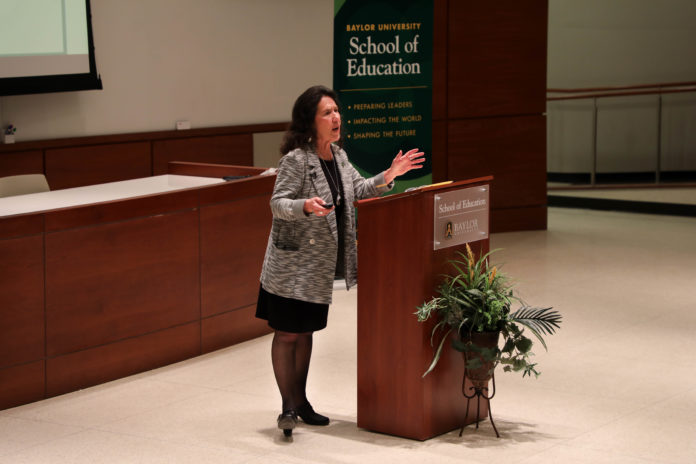
By Bridget Sjoberg | Staff Writer
Dr. Maria Franquiz, an expert in bilingual education, discussed the role of language as a resource to incorporate in classrooms and as a way to make students feel valued when she spoke at Baylor on Tuesday.
The lecture celebrated the School of Education’s centennial, marking 100 years since the School was founded in 1919. Dr. Terrill F. Saxon, interim dean of the School of Education, said that Franquiz’s focus on the importance of bilingual education appeared to be a relevant topic when choosing a speaker for the event.
“We wanted to have a speaker on campus who had a national reputation and was doing work that would be interesting and current in our nation and definitely in our state and community,” Saxon said. “Because of what the nation is dealing with in education and immigration, an issue involves ideas around how to address non-native English speakers in our schools. It wasn’t difficult to decide that bilingual education is a current topic being discussed at every level.”
Franquiz, who currently teaches at and works for the University of Utah’s College of Education, is co-editor of Bilingual Research Journal and has published numerous books and articles on the topic of bilingual education. She discussed in her lecture how bilingualism should be viewed as a resource that can benefit students as opposed to language being treated as a barrier.
“Today, many people do not understand that bilingualism is a gift,” Franquiz said. “This gift, when developed to its full potential, is one that students can share with others. Often times, language can be a resource for building a second or third language. Many places in the world view language as a human right.”
Franquiz also discussed the harm that can result from placing labels on students from a young age that directly correspond to their English-speaking abilities.
“Language as a resource means to avoid labels — calling students limited English proficient (LEP) highlights what a person lacks and not the cultural wealth that they possess,” Franquiz said. “When someone gets labeled and is told every year that they’re an LEP, that can take a toll on one’s self esteem. What is valued about your assessment becomes invisible and often erased. Labels like LEP contribute to a broader ideological discourse promoting one nation, one language, which is not the authentic reality or the reality of what kids will need for the future.”
Along with discussing language specifically, Franquiz also touched on the importance of making sure that all children are represented in literature and are exposed to authentic representations of other cultures.
“It’s important that children be provided an opportunity to see a mirror text- if you don’t see yourself in literature and nothing that represents your family or community, you can feel devalued in class, which leads to feeling devalued in school and society outside of school,” Franquiz said. “Many children go through this when they can’t find books that in some way reflect themselves. It’s also important for students to be exposed to window texts, which serve as a window to authentic representations of other peoples’ lives and experiences.”
Saxon viewed the lecture’s theme “Illuminating the World through the Gift of Bilingualism” as a relevant topic for Baylor’s School of Education centennial address, as it not only looked back on the history of bilingual laws and policies, but also looked ahead for ways to best use language as a resource in classrooms.
“Our centennial isn’t just about our past 100 years but is also about our next 100 years,” Saxon said. “It causes us to think about things we may be dealing with next week and 20 years from now, and bilingualism is one of those things.”
Along with Tuesday’s lecture, communications assistant Becky Aydelotte said that the School of Education plans to celebrate their centennial with some type of event each month, including their sponsoring of a Dr Pepper hour last month and possible Homecoming-related events in the future. A display on a staircase within Mars McLean also extends three stories, and includes graphics and information highlighting the history of Baylor’s School of Education.
“We’re going to have a special display in the Mayborn that is similar to the staircase but with more detail,” Aydelotte said. “We’ll also have a centennial birthday celebration in the courtyard next month featuring live music and giveaways on March 22, which is the actual 100-year date. We’ll also have pop-up giveaways throughout the year with things like flowers and hot chocolate promoting School of Ed.”
Saxon said that key topics that School of Education will focus on moving forward include continued focus on immersing students in classrooms early on, dealing with teacher shortages without sacrificing program quality and mental health and special education programs.
More information about School of Education’s centennial can be found at https://www.baylor.edu/soe/100/.





